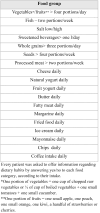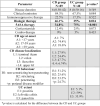Impact of Dietary Patterns in Inflammatory Bowel Disease Subtypes Versus Healthy Subjects: a Retrospective Cohort Study
- PMID: 37588829
- PMCID: PMC10427093
- DOI: 10.26574/maedica.2023.18.2.174
Impact of Dietary Patterns in Inflammatory Bowel Disease Subtypes Versus Healthy Subjects: a Retrospective Cohort Study
Abstract
Objectives:Inflammatory bowel diseases (IBD) have been associated with multiple environmental factors, including diet. A dietary pattern characterized by low fiber content, high fat content and high carbohydrate content has been linked to the development of IBD. The objective of the current investigation is to examine the potential link between dietary patterns and the occurrence of IBD and to investigate whether there are any differences in relation to the type of IBD and specific food groups. Material and methods:We conducted an observational retrospective comparative study using three cohorts: 89 Crohn's disease (CD) patients, 40 ulcerative colitis (UC) patients and 64 healthy subjects. All participants underwent structured interviews and were required to complete a questionnaire regarding their dietary habits either prior to the onset of IBD or within the last year for control subjects. Results:A higher proportion of CD patients reported a higher rate of salt intake (71.9% vs. 53.1%, p-value = 0.043), sweetened beverages (38.2% vs. 17.2%, p-value=0.022), processed meat (66.3% vs. 40.6%, p-value=0.007), fatty meat (50.6% vs. 28.1%, p-value=0.021), fried foods (47.2% vs. 9.4%, p-value<0.001) and mayonnaise (21.3% vs. 6.2%, p-value=0.032) and a lower intake of nuts and seeds (20.2% vs. 43.8%, p-value=0.004) and yogurt (23.6% vs. 43.8%, p-value=0.030) compared to healthy subjects. Compared to controls, in the UC group there was a higher consumption of salt (85% vs. 53.1%, p-value=0.003), sweetened beverages (47.5% vs. 17.2%, p-value=0.005), fatty meat (55% vs. 28.1%, p-value=0.025) and fried foods (55% vs. 9.4%, p-value<0.001) and a lower intake of nuts and seeds (10% vs. 43.8%, p-value=0.001). Conclusion:Diet patterns before the onset of the disease are similar in patients with Crohn's disease and patients with ulcerative colitis: increased consumption of sweetened beverages, processed and fatty meat, fried food, salt, store-bought ice cream, and mayonnaise, and decreased intake of seeds, nuts, and yogurt.
Figures
References
-
- Kuenzig ME, Fung SG, Marderfeld L, et al. Twenty-first Century Trends in the Global Epidemiology of Pediatric-Onset Inflammatory Bowel Disease: Systematic Review. Gastroenterology. 2022;162:1147–1159. - PubMed
-
- Ng SC, Shi HY, Hamidi N, et al. Worldwide incidence and prevalence of inflammatory bowel disease in the 21st century: a systematic review of population-based studies. Lancet. 2017;390:2769–2778. - PubMed
-
- Carmen-Monica P, Doina I. Etiology of Ulcerative Colitis. In: Ulcerative Colitis.Partha, P, Ed. IntechOpen: Rijeka. 2022, p Ch. 1.
-
- Derwa Y, Gracie, DJ, Hamlin PJ, Ford AC. Systematic review with meta-analysis: the efficacy of probiotics in inflammatory bowel disease. Aliment Pharmacol Ther. 2017;46:389–400. - PubMed
Publication types
LinkOut - more resources
Full Text Sources





